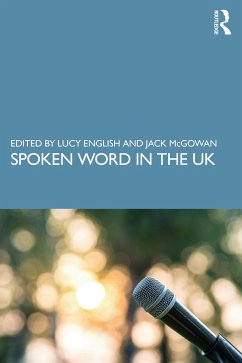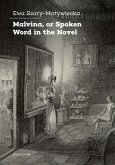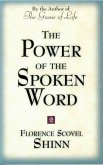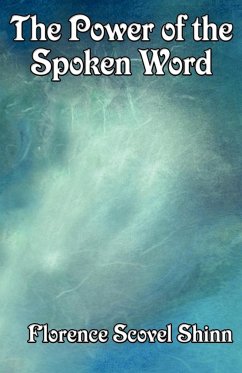Spoken Word in the UK
Herausgeber: English, Lucy; McGowan, Jack
Spoken Word in the UK
Herausgeber: English, Lucy; McGowan, Jack
- Broschiertes Buch
- Merkliste
- Auf die Merkliste
- Bewerten Bewerten
- Teilen
- Produkt teilen
- Produkterinnerung
- Produkterinnerung
Spoken Word in the UK is a comprehensive and in-depth introduction to spoken word performance in the UK - its origins and development, its performers and audiences, and the vast array of different styles and characteristics that make it unique.
Andere Kunden interessierten sich auch für
![The Voice Coach's Toolkit The Voice Coach's Toolkit]() Pamela PratherThe Voice Coach's Toolkit32,99 €
Pamela PratherThe Voice Coach's Toolkit32,99 €![The Routledge Intermediate Welsh Reader The Routledge Intermediate Welsh Reader]() Gareth KingThe Routledge Intermediate Welsh Reader68,99 €
Gareth KingThe Routledge Intermediate Welsh Reader68,99 €![Hip-Hop and Spoken Word Therapy in School Counseling Hip-Hop and Spoken Word Therapy in School Counseling]() Ian Levy (USA Manhattan College)Hip-Hop and Spoken Word Therapy in School Counseling179,99 €
Ian Levy (USA Manhattan College)Hip-Hop and Spoken Word Therapy in School Counseling179,99 €![Malvina, or Spoken Word in the Novel Malvina, or Spoken Word in the Novel]() Ewa Szary-MatywieckaMalvina, or Spoken Word in the Novel20,99 €
Ewa Szary-MatywieckaMalvina, or Spoken Word in the Novel20,99 €![The Power of the Spoken Word The Power of the Spoken Word]() Florence S. ShinnThe Power of the Spoken Word7,99 €
Florence S. ShinnThe Power of the Spoken Word7,99 €![NOTHING CONCLUSIVE HAS YET TAKEN PLACE IN THE WORLD THE ULTIMATE WORD OF THE WORLD AND ABOUT THE WORLD HAS NOT YET BEEN SPOKEN THE WORLD IS OPEN AND FREE EVERYTHING IS STILL IN THE FUTURE AND WILL ALWAYS BE NOTHING CONCLUSIVE HAS YET TAKEN PLACE IN THE WORLD THE ULTIMATE WORD OF THE WORLD AND ABOUT THE WORLD HAS NOT YET BEEN SPOKEN THE WORLD IS OPEN AND FREE EVERYTHING IS STILL IN THE FUTURE AND WILL ALWAYS BE]() Tim AtkinsNOTHING CONCLUSIVE HAS YET TAKEN PLACE IN THE WORLD THE ULTIMATE WORD OF THE WORLD AND ABOUT THE WORLD HAS NOT YET BEEN SPOKEN THE WORLD IS OPEN AND FREE EVERYTHING IS STILL IN THE FUTURE AND WILL ALWAYS BE14,99 €
Tim AtkinsNOTHING CONCLUSIVE HAS YET TAKEN PLACE IN THE WORLD THE ULTIMATE WORD OF THE WORLD AND ABOUT THE WORLD HAS NOT YET BEEN SPOKEN THE WORLD IS OPEN AND FREE EVERYTHING IS STILL IN THE FUTURE AND WILL ALWAYS BE14,99 €![The Power of the Spoken Word The Power of the Spoken Word]() Florence Scovel ShinnThe Power of the Spoken Word10,99 €
Florence Scovel ShinnThe Power of the Spoken Word10,99 €-
-
-
Spoken Word in the UK is a comprehensive and in-depth introduction to spoken word performance in the UK - its origins and development, its performers and audiences, and the vast array of different styles and characteristics that make it unique.
Hinweis: Dieser Artikel kann nur an eine deutsche Lieferadresse ausgeliefert werden.
Hinweis: Dieser Artikel kann nur an eine deutsche Lieferadresse ausgeliefert werden.
Produktdetails
- Produktdetails
- Verlag: Taylor & Francis Ltd
- Seitenzahl: 490
- Erscheinungstermin: 29. April 2021
- Englisch
- Abmessung: 234mm x 156mm x 26mm
- Gewicht: 724g
- ISBN-13: 9780367352530
- ISBN-10: 0367352532
- Artikelnr.: 60796713
- Herstellerkennzeichnung
- Libri GmbH
- Europaallee 1
- 36244 Bad Hersfeld
- gpsr@libri.de
- Verlag: Taylor & Francis Ltd
- Seitenzahl: 490
- Erscheinungstermin: 29. April 2021
- Englisch
- Abmessung: 234mm x 156mm x 26mm
- Gewicht: 724g
- ISBN-13: 9780367352530
- ISBN-10: 0367352532
- Artikelnr.: 60796713
- Herstellerkennzeichnung
- Libri GmbH
- Europaallee 1
- 36244 Bad Hersfeld
- gpsr@libri.de
Lucy English is a reader in creative writing and head of the Creative Writing Research Centre at Bath Spa University, UK. Jack McGowan is a senior lecturer in creative writing at the University of Worcester, UK.
Foreword by Luke Kennard; Introduction: Setting the Stage: An Introduction
to Spoken Word in the UK - Jack McGowan and Lucy English (Editors);
Section 1: Background to Spoken Word in the UK; Chapter 1: Biting Back
Against the Fascist Octopus: The Story of Apples and Snakes - Russell
Thompson; Chapter 2: Suffering Fools: The survival and adaptation of
British absurd, comic, and satirical traditions in the era of poetry slams
- Steve Larkin; Chapter 3: Black Country, Ay We - Voices from
Post-Industrial Britain - Emma Purshouse and R. M. Francis; Chapter 4: The
New October Poets - Adrian Johnson; Chapter 5: Glasgow, Scotland and Spoken
Word from 1986 to 2018 - Jim Ferguson; Chapter 6: A critical account of the
development of Spoken Word events and settings in Wales in collaboration
with partners in Sweden and Ireland - Mel Perry and Dominic Williams;
Chapter 7: The Democracy of Poetry: The Bristol Spoken Word Scene - Lucy
English; Section 2: Audience and Performer; Chapter 8: The Spoken Word
Experience: affect transmission in contemporary performance poetry - Jack
McGowan; Chapter 9: The Limitations of the Page/Stage Dichotomy: Examining
the page/stage divide - Niall O'Sullivan; Chapter 10: Exploring the
relationship between audience and performer, the implications of the
affective turn in reader-response and the emancipation of the passive
spectator - Scott Martingell; Chapter 11: 'Speak Your Truth': Authenticity
in UK Spoken Word Poetry - Katie Ailes; Chapter 12: Audience as Co-Author:
Poet-Audience Relationship in Performance Poetry - Lauren McNamara;
Chapter 13: Listen to me! The moral value of the poetry performance space -
Karen Simecek; Chapter 14: Audience and performer responses to performing
1-2-1 and intimate poetry - Debra Watson; Section 3: Cultural Exchange;
Chapter 15: Poetic Orality in Working-Class Culture 1840-70 - Simon Rennie;
Chapter 16: She Grrrowls: Feminism in Contemporary Spoken Word - Carmina
Masoliver; Chapter 17: Playing for Affect in Counterpublics: An
Interdisciplinary Investigation into the Transformative Potential of Spoken
Word Hybridity - Katy Wareham Morris; Chapter 18: The Metic Experience of
the Black British Writer: Challenging the Margins - Nick Makoha; Chapter
19: Overthrowing Societal Norms Through the Spoken Word: Benjamin
Zephaniah's Dub Poetry in City Psalms - Ian Hickey; Chapter 20: The Impact
of Malika's Poetry Kitchen on the UK Poetry Scene - Sundra Lawrence;
Section 4: Styles and Techniques; Chapter 21: Fish Out of Water or Creative
Chameleon?: Spoken Word as a form of Social Mobility - Kate Fox; Chapter
22: Style and Technique in Spoken Word - David Hubble; Chapter 23: British
Spoken Word Voice - Hannah Silva; Chapter 24: I thought I was just coming
to watch: Audience Participation in Spoken Word Performance - Rose Condo;
Section 5: Pedagogy of Spoken Word; Chapter 25: How can developing an
Overarching Pedagogical Metaphor defining my own poetics, aid my teaching
of creative writing and 'Spoken Word Education'? - Amy Neilson; Chapter 26:
Spoken Word Education: The Role of a Spoken Word Educator: Pitfalls and
Possibilities - Sara Hirsch; Chapter 27: Searching for Consistency:
Applying Reflective Equilibrium to Performance Poetry Criticism - Ross
McFarlane and Bibi June Schwithal; Chapter 28: Spoken Word as Therapy and
Power - Jhilmil Breckenridge; Chapter 29: Intersections Between Spoken Word
in the UK and US: A Nexus in Dialogue - Helen Johnson and Jacob Sam La
Rose; Section 6: Publicity and Distribution; Chapter 30: Speaking with
Machines & Machines that Speak: Spoken Word & Digital Performance Poetry -
David Devanny; Chapter 31: The Capital of Culture and the Culture of
Capital: The Controversy of Commerce in Spoken Word - Peter Bearder;
Chapter 32: Poetry Slam in the UK - Toby Campion; Chapter 33: More Show,
Less Tell?: How do we talk about spoken word now that it is working on a
theatre stage? - Sharon Clark and Ruth Stacey; Chapter 34: Spoken Word in
Print. Instant Coffee: A conversation with Clive Birnie from Burning Eye
Books -Clive Birnie (interviewed by Lucy English)
to Spoken Word in the UK - Jack McGowan and Lucy English (Editors);
Section 1: Background to Spoken Word in the UK; Chapter 1: Biting Back
Against the Fascist Octopus: The Story of Apples and Snakes - Russell
Thompson; Chapter 2: Suffering Fools: The survival and adaptation of
British absurd, comic, and satirical traditions in the era of poetry slams
- Steve Larkin; Chapter 3: Black Country, Ay We - Voices from
Post-Industrial Britain - Emma Purshouse and R. M. Francis; Chapter 4: The
New October Poets - Adrian Johnson; Chapter 5: Glasgow, Scotland and Spoken
Word from 1986 to 2018 - Jim Ferguson; Chapter 6: A critical account of the
development of Spoken Word events and settings in Wales in collaboration
with partners in Sweden and Ireland - Mel Perry and Dominic Williams;
Chapter 7: The Democracy of Poetry: The Bristol Spoken Word Scene - Lucy
English; Section 2: Audience and Performer; Chapter 8: The Spoken Word
Experience: affect transmission in contemporary performance poetry - Jack
McGowan; Chapter 9: The Limitations of the Page/Stage Dichotomy: Examining
the page/stage divide - Niall O'Sullivan; Chapter 10: Exploring the
relationship between audience and performer, the implications of the
affective turn in reader-response and the emancipation of the passive
spectator - Scott Martingell; Chapter 11: 'Speak Your Truth': Authenticity
in UK Spoken Word Poetry - Katie Ailes; Chapter 12: Audience as Co-Author:
Poet-Audience Relationship in Performance Poetry - Lauren McNamara;
Chapter 13: Listen to me! The moral value of the poetry performance space -
Karen Simecek; Chapter 14: Audience and performer responses to performing
1-2-1 and intimate poetry - Debra Watson; Section 3: Cultural Exchange;
Chapter 15: Poetic Orality in Working-Class Culture 1840-70 - Simon Rennie;
Chapter 16: She Grrrowls: Feminism in Contemporary Spoken Word - Carmina
Masoliver; Chapter 17: Playing for Affect in Counterpublics: An
Interdisciplinary Investigation into the Transformative Potential of Spoken
Word Hybridity - Katy Wareham Morris; Chapter 18: The Metic Experience of
the Black British Writer: Challenging the Margins - Nick Makoha; Chapter
19: Overthrowing Societal Norms Through the Spoken Word: Benjamin
Zephaniah's Dub Poetry in City Psalms - Ian Hickey; Chapter 20: The Impact
of Malika's Poetry Kitchen on the UK Poetry Scene - Sundra Lawrence;
Section 4: Styles and Techniques; Chapter 21: Fish Out of Water or Creative
Chameleon?: Spoken Word as a form of Social Mobility - Kate Fox; Chapter
22: Style and Technique in Spoken Word - David Hubble; Chapter 23: British
Spoken Word Voice - Hannah Silva; Chapter 24: I thought I was just coming
to watch: Audience Participation in Spoken Word Performance - Rose Condo;
Section 5: Pedagogy of Spoken Word; Chapter 25: How can developing an
Overarching Pedagogical Metaphor defining my own poetics, aid my teaching
of creative writing and 'Spoken Word Education'? - Amy Neilson; Chapter 26:
Spoken Word Education: The Role of a Spoken Word Educator: Pitfalls and
Possibilities - Sara Hirsch; Chapter 27: Searching for Consistency:
Applying Reflective Equilibrium to Performance Poetry Criticism - Ross
McFarlane and Bibi June Schwithal; Chapter 28: Spoken Word as Therapy and
Power - Jhilmil Breckenridge; Chapter 29: Intersections Between Spoken Word
in the UK and US: A Nexus in Dialogue - Helen Johnson and Jacob Sam La
Rose; Section 6: Publicity and Distribution; Chapter 30: Speaking with
Machines & Machines that Speak: Spoken Word & Digital Performance Poetry -
David Devanny; Chapter 31: The Capital of Culture and the Culture of
Capital: The Controversy of Commerce in Spoken Word - Peter Bearder;
Chapter 32: Poetry Slam in the UK - Toby Campion; Chapter 33: More Show,
Less Tell?: How do we talk about spoken word now that it is working on a
theatre stage? - Sharon Clark and Ruth Stacey; Chapter 34: Spoken Word in
Print. Instant Coffee: A conversation with Clive Birnie from Burning Eye
Books -Clive Birnie (interviewed by Lucy English)
Foreword by Luke Kennard; Introduction: Setting the Stage: An Introduction
to Spoken Word in the UK - Jack McGowan and Lucy English (Editors);
Section 1: Background to Spoken Word in the UK; Chapter 1: Biting Back
Against the Fascist Octopus: The Story of Apples and Snakes - Russell
Thompson; Chapter 2: Suffering Fools: The survival and adaptation of
British absurd, comic, and satirical traditions in the era of poetry slams
- Steve Larkin; Chapter 3: Black Country, Ay We - Voices from
Post-Industrial Britain - Emma Purshouse and R. M. Francis; Chapter 4: The
New October Poets - Adrian Johnson; Chapter 5: Glasgow, Scotland and Spoken
Word from 1986 to 2018 - Jim Ferguson; Chapter 6: A critical account of the
development of Spoken Word events and settings in Wales in collaboration
with partners in Sweden and Ireland - Mel Perry and Dominic Williams;
Chapter 7: The Democracy of Poetry: The Bristol Spoken Word Scene - Lucy
English; Section 2: Audience and Performer; Chapter 8: The Spoken Word
Experience: affect transmission in contemporary performance poetry - Jack
McGowan; Chapter 9: The Limitations of the Page/Stage Dichotomy: Examining
the page/stage divide - Niall O'Sullivan; Chapter 10: Exploring the
relationship between audience and performer, the implications of the
affective turn in reader-response and the emancipation of the passive
spectator - Scott Martingell; Chapter 11: 'Speak Your Truth': Authenticity
in UK Spoken Word Poetry - Katie Ailes; Chapter 12: Audience as Co-Author:
Poet-Audience Relationship in Performance Poetry - Lauren McNamara;
Chapter 13: Listen to me! The moral value of the poetry performance space -
Karen Simecek; Chapter 14: Audience and performer responses to performing
1-2-1 and intimate poetry - Debra Watson; Section 3: Cultural Exchange;
Chapter 15: Poetic Orality in Working-Class Culture 1840-70 - Simon Rennie;
Chapter 16: She Grrrowls: Feminism in Contemporary Spoken Word - Carmina
Masoliver; Chapter 17: Playing for Affect in Counterpublics: An
Interdisciplinary Investigation into the Transformative Potential of Spoken
Word Hybridity - Katy Wareham Morris; Chapter 18: The Metic Experience of
the Black British Writer: Challenging the Margins - Nick Makoha; Chapter
19: Overthrowing Societal Norms Through the Spoken Word: Benjamin
Zephaniah's Dub Poetry in City Psalms - Ian Hickey; Chapter 20: The Impact
of Malika's Poetry Kitchen on the UK Poetry Scene - Sundra Lawrence;
Section 4: Styles and Techniques; Chapter 21: Fish Out of Water or Creative
Chameleon?: Spoken Word as a form of Social Mobility - Kate Fox; Chapter
22: Style and Technique in Spoken Word - David Hubble; Chapter 23: British
Spoken Word Voice - Hannah Silva; Chapter 24: I thought I was just coming
to watch: Audience Participation in Spoken Word Performance - Rose Condo;
Section 5: Pedagogy of Spoken Word; Chapter 25: How can developing an
Overarching Pedagogical Metaphor defining my own poetics, aid my teaching
of creative writing and 'Spoken Word Education'? - Amy Neilson; Chapter 26:
Spoken Word Education: The Role of a Spoken Word Educator: Pitfalls and
Possibilities - Sara Hirsch; Chapter 27: Searching for Consistency:
Applying Reflective Equilibrium to Performance Poetry Criticism - Ross
McFarlane and Bibi June Schwithal; Chapter 28: Spoken Word as Therapy and
Power - Jhilmil Breckenridge; Chapter 29: Intersections Between Spoken Word
in the UK and US: A Nexus in Dialogue - Helen Johnson and Jacob Sam La
Rose; Section 6: Publicity and Distribution; Chapter 30: Speaking with
Machines & Machines that Speak: Spoken Word & Digital Performance Poetry -
David Devanny; Chapter 31: The Capital of Culture and the Culture of
Capital: The Controversy of Commerce in Spoken Word - Peter Bearder;
Chapter 32: Poetry Slam in the UK - Toby Campion; Chapter 33: More Show,
Less Tell?: How do we talk about spoken word now that it is working on a
theatre stage? - Sharon Clark and Ruth Stacey; Chapter 34: Spoken Word in
Print. Instant Coffee: A conversation with Clive Birnie from Burning Eye
Books -Clive Birnie (interviewed by Lucy English)
to Spoken Word in the UK - Jack McGowan and Lucy English (Editors);
Section 1: Background to Spoken Word in the UK; Chapter 1: Biting Back
Against the Fascist Octopus: The Story of Apples and Snakes - Russell
Thompson; Chapter 2: Suffering Fools: The survival and adaptation of
British absurd, comic, and satirical traditions in the era of poetry slams
- Steve Larkin; Chapter 3: Black Country, Ay We - Voices from
Post-Industrial Britain - Emma Purshouse and R. M. Francis; Chapter 4: The
New October Poets - Adrian Johnson; Chapter 5: Glasgow, Scotland and Spoken
Word from 1986 to 2018 - Jim Ferguson; Chapter 6: A critical account of the
development of Spoken Word events and settings in Wales in collaboration
with partners in Sweden and Ireland - Mel Perry and Dominic Williams;
Chapter 7: The Democracy of Poetry: The Bristol Spoken Word Scene - Lucy
English; Section 2: Audience and Performer; Chapter 8: The Spoken Word
Experience: affect transmission in contemporary performance poetry - Jack
McGowan; Chapter 9: The Limitations of the Page/Stage Dichotomy: Examining
the page/stage divide - Niall O'Sullivan; Chapter 10: Exploring the
relationship between audience and performer, the implications of the
affective turn in reader-response and the emancipation of the passive
spectator - Scott Martingell; Chapter 11: 'Speak Your Truth': Authenticity
in UK Spoken Word Poetry - Katie Ailes; Chapter 12: Audience as Co-Author:
Poet-Audience Relationship in Performance Poetry - Lauren McNamara;
Chapter 13: Listen to me! The moral value of the poetry performance space -
Karen Simecek; Chapter 14: Audience and performer responses to performing
1-2-1 and intimate poetry - Debra Watson; Section 3: Cultural Exchange;
Chapter 15: Poetic Orality in Working-Class Culture 1840-70 - Simon Rennie;
Chapter 16: She Grrrowls: Feminism in Contemporary Spoken Word - Carmina
Masoliver; Chapter 17: Playing for Affect in Counterpublics: An
Interdisciplinary Investigation into the Transformative Potential of Spoken
Word Hybridity - Katy Wareham Morris; Chapter 18: The Metic Experience of
the Black British Writer: Challenging the Margins - Nick Makoha; Chapter
19: Overthrowing Societal Norms Through the Spoken Word: Benjamin
Zephaniah's Dub Poetry in City Psalms - Ian Hickey; Chapter 20: The Impact
of Malika's Poetry Kitchen on the UK Poetry Scene - Sundra Lawrence;
Section 4: Styles and Techniques; Chapter 21: Fish Out of Water or Creative
Chameleon?: Spoken Word as a form of Social Mobility - Kate Fox; Chapter
22: Style and Technique in Spoken Word - David Hubble; Chapter 23: British
Spoken Word Voice - Hannah Silva; Chapter 24: I thought I was just coming
to watch: Audience Participation in Spoken Word Performance - Rose Condo;
Section 5: Pedagogy of Spoken Word; Chapter 25: How can developing an
Overarching Pedagogical Metaphor defining my own poetics, aid my teaching
of creative writing and 'Spoken Word Education'? - Amy Neilson; Chapter 26:
Spoken Word Education: The Role of a Spoken Word Educator: Pitfalls and
Possibilities - Sara Hirsch; Chapter 27: Searching for Consistency:
Applying Reflective Equilibrium to Performance Poetry Criticism - Ross
McFarlane and Bibi June Schwithal; Chapter 28: Spoken Word as Therapy and
Power - Jhilmil Breckenridge; Chapter 29: Intersections Between Spoken Word
in the UK and US: A Nexus in Dialogue - Helen Johnson and Jacob Sam La
Rose; Section 6: Publicity and Distribution; Chapter 30: Speaking with
Machines & Machines that Speak: Spoken Word & Digital Performance Poetry -
David Devanny; Chapter 31: The Capital of Culture and the Culture of
Capital: The Controversy of Commerce in Spoken Word - Peter Bearder;
Chapter 32: Poetry Slam in the UK - Toby Campion; Chapter 33: More Show,
Less Tell?: How do we talk about spoken word now that it is working on a
theatre stage? - Sharon Clark and Ruth Stacey; Chapter 34: Spoken Word in
Print. Instant Coffee: A conversation with Clive Birnie from Burning Eye
Books -Clive Birnie (interviewed by Lucy English)








